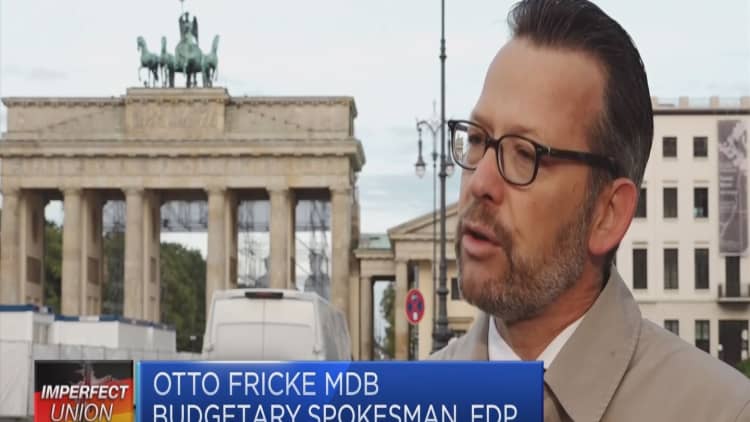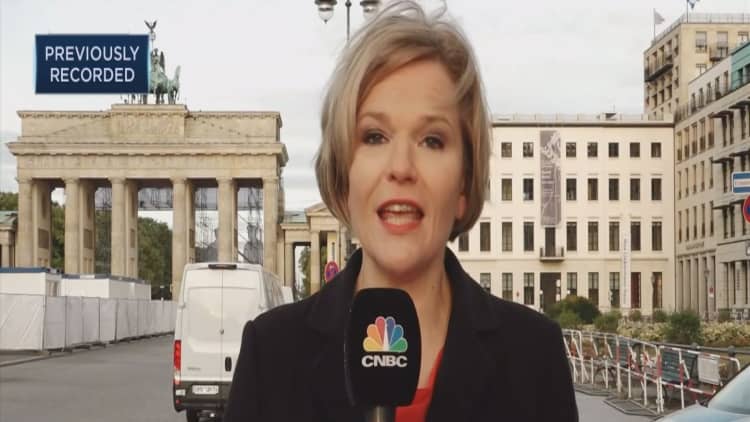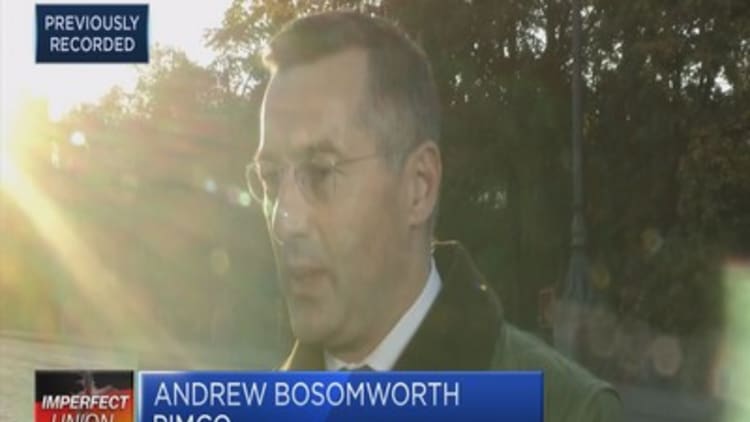German Chancellor Angela Merkel has seen her grip on power wane following an inconclusive election a year ago.
Now, leading a fragile and fractious coalition government, unpopular with voters and nervously watching the rise of the right-wing on the sidelines, Merkel is facing an open rebellion within her own party, the Christian Democratic Union (CDU).
This is leading Germany's political establishment, and the public, to ask who and what will come after Merkel's time in office comes to an end.
She has been chancellor in Germany since 2005 and has been widely seen as a safe pair of hands, steering the euro zone's largest economy through the financial crisis.
Nicknamed "Mutti" (or mother) in Germany, Merkel was also seen as a driving force for fiscal prudence in the euro zone at the height of the sovereign debt crisis, encouraging countries that had received bailouts to adhere to austerity measures. While her emphasis on austerity made her an unpopular figure among the bailout nations, many admired her for steering the single currency area through the slowdown.
As the euro zone started to recover from its financial woes, another crisis hit the region in 2015 when Europe witnessed an influx of migrants and refugees fleeing conflict in the Middle East, particularly the civil war in Syria.
Again, Merkel garnered praise in many quarters for her principled stance when migration peaked — allowing over a million migrants to enter the country in 2015 — but the decision also cost her dearly. Her permissive position on migration has been cited as a reason that Merkel's party did not fare so well in the country's last election and as helping the rise of right-wing party, the Alternative for Germany (AfD).
Merkel has since rowed back on her more open stance on migration, public and political arguments continue to be dominated by the changing nature of German society and politics. As the soul searching continues for the German public, the tide appears to be turning against Merkel with many calling for her to go.
Quentin Peel, an associate fellow with the Europe Programme at Chatham House, the Royal Institute of International Affairs in London, told CNBC Wednesday that although Merkel looks weakened, it's not clear who could fill her place.
"Merkel is great at sorting everything out, she's a great crisis solver and crisis manager, but she's threatened now … (However) the argument 'that there is no alternative' remains a strong one. When you look at who might replace Merkel, it's not that obvious who could do so," he said.
Collapsing coalition
Merkel is now into her fourth term as chancellor having led the German government since 2005. But in 2018, her position is not looking as strong as it once was.
In fact, only 17 percent of Germans are still "very satisfied" or "satisfied" with the chancellor's work, an opinion poll by YouGov for German newspaper Handelsblatt showed. Worse for Merkel, the poll of 2,067 people carried out in late September and published September 29, found that 21 percent are "rather dissatisfied" and 33 percent are "very dissatisfied" with Merkel's current performance.
A very low 2 percent and 9 percent are "very" or "rather satisfied" respectively with the work of the federal government.
That the public is fed up with government is no surprise — Merkel has been leading a fractious coalition since voters delivered a hung parliament during Germany's last election in September 2017.
The coalition itself took months to form with Merkel's CDU party and its allied Bavarian sister party, the Christian Social Union (CSU), having to turn to the Social Democratic Party (SPD) to form a "Grand Coalition" able to govern.
With Merkel's earlier talks with alternative political parties aimed at forming a government failing, and the specter of far-right politics looming after the success of the right-wing AfD in the election, the SPD seemed to feel obliged (and rather reluctant) to enter the coalition.

Needless to say, the six-month old coalition is not a happy one. There has been ongoing infighting over Germany's stance on immigration and, most recently, a very public dispute over the head of the country's intelligence agency who was accused of harboring far-right views.
Talk in Germany has started to turn to if and when the coalition could collapse.
"Clearly if you look at the polls the 'Grand Coalition' wouldn't win an election today. In the polls, the CDU continues to fall and is certainly less popular than before," Tomasz Wieladek, senior international economist at Barclays, told CNBC on Wednesday.
"The 'Grand Coalition' seems to be really struggling with small issues at the moment. If a big issue arises, the current government could really struggle," he added.
Domestic problems
Merkel has come under even more political pressure in recent weeks. In particular, there are tensions in the CDU-CSU-SPD government over competing reforms regarding domestic issues, and her asylum policy.
The CSU, with its more traditional, conservative Bavarian focus, has railed against Merkel's stance toward refugees and Merkel had a very public spat with interior minister and chairman of the CSU, Horst Seehofer, over the matter. The relationship between the sister parties has been left fragile.
"The integration of refugees remains one of the most heated discussions in German politics," ING economist Carsten Brzeski said in a note in September.
"Over the summer, tensions within the government on border controls but also a further rise in polls for the Alternative for Germany (AfD) on the back of riots in Saxony shows how fragile the often-referred-to political stability in Germany actually is."
Her handling of the firing of spy chief Hans-Georg Maaßen was widely criticized. That prompted Merkel to make a rare public apology, admitting to having made mistakes over the matter.
Then, Merkel's long-time ally and confidant Volker Kauder was defeated in a secret ballot to elect the leader of the CDU's parliamentary group at the end of September. This despite her explicit support for him and recommendation that he be re-elected. He lost to CDU lawmaker Ralph Brinkhaus.
Chatham House's Quentin Peel believes that Merkel is being undermined by her own party as lawmakers turned against her and blamed her for the party's declining popularity.
"Merkel's loss of authority is due to the Conservatives within her own party. They've always hated her but couldn't do anything about it because she was almost single-handedly responsible for getting most of them re-elected. Her personal popularity (with the public) was remarkable," he said.
If not Merkel, then who?
The obvious party rebellion in September sent shock waves through political circles in the German capital and prompted newspapers to question how much longer Merkel could stay in power.
While there is no obvious successor to the chancellor, experts say the pragmatic Merkel is unlikely to want to outstay her welcome.
Peel believes Merkel would stay in her post for another 18 to 24 months, meaning she would not see out the whole of her fourth term. He did not rule out an abrupt departure, however.
"Merkel plays a very long game and German politics tends to move quite slowly — but when it does move it can be abrupt," Peel said. "I can't think of any obvious replacement, however."
Experts believe there are a handful of possible replacements, ranging from Annegret Kramp-Karrenbauer, the new general secretary of the CDU who shares a lot of Merkel's practical approach to politics (earning her the nickname of "Merkel's mini-me") to Jens Spahn, a young, gay but staunchly conservative minister who could potentially broaden the party's appeal. Even Ralph Brinkhaus, who defeated Merkel's ally Volter Kauder to become leader of the CDU's parliamentary group, has been named as a possible contender.
Better known candidates for the top job include the Minister of Defense Ursula von der Leyen, but Peel said she was considered too left-leaning and "too ambitious" for most party members.

Peel said that experienced and popular politician Wolfgang Schaeuble, who's now president of the Bundestag, could be a possible candidate to "hold the fort" as an interim leader if Merkel's departure left a leadership vacuum. At 76, however, he's not expected to want the job on a permanent basis.
"Any alternative to Merkel does not have broad support," Peel said, but he feels her grip on power would rely on whether the CDU itself would "hang on to her."
"I think she'll carry on for another 18 months to two years but her authority and popularity is lower now, so what will decide her future is not the state of the coalition but the state of her party — that's where the revolt will come from."
'Alive and kicking'
For her part, and despite a string of domestic troubles and increasing calls for her to consider her position, Merkel has shown no intention of standing down early.
"I'm sitting here alive and kicking, and I'm planning on keeping on with my work," Merkel told an audience in the Bavarian city of Augsburg in an interview with Augsburger Allgemeine in late September.
Questions have been raised over what a Merkel departure could mean for the economy, the largest in the euro zone and Europe. The latest reading of Germany's gross domestic product (GDP) showed the predominantly export-orientated economy expanded in the second quarter by a robust 0.5 percent, from the previous quarter.
The German government expected a robust 2.3 percent growth in 2018 although on Thursday, there were reports this could be cut to 1.8 percent amid global trade tensions.
Germany runs a budget surplus (its tax receipts outweighing its spending) and the surplus this year is at its highest level since German reunification in 1990. As such, pressure is rising on the government to increase public spending and investment, especially as infrastructure and services come under pressure.
Barclays' Wieladek argued that public anger toward the German government was prompted by spending cuts to public services, rather than migration.
"Public services have been cut back in the past decade and have been stretched further by the large-scale arrival of migrants. And voters are concerned about overcrowded classrooms in schools and overstretched police forces," he said.
"Germany is running a fiscal surplus so the government could use that to alleviate the pressures on public services, but these are currently not being deployed to the full extent possible. They really need to do a big bang approach to fix public services and the current arrangement does not seem to be delivering that."
The Bavarian test
Another big test for Angela Merkel, and more so, the CDU's Bavarian sister party, the CSU, came on October 14 when Bavaria held a regional state elections. The CSU fared badly in the vote, as predicted by polls, seeing its worst election result since 1950 on Sunday and losing its long-held majority. Meanwhile, the Green party and far-right Alternative for Germany (AfD) party saw their vote share increase.
Bavaria matters because it is the largest state, and one of the richest, in Germany, home to around 16 percent of the German population and accounting for 18.3 percent of the country's gross domestic product. Another state election in Hesse on October 28 could also herald further losses for the CDU-CSU.
Political analysts and economists say the result will have big ramifications on the fractious coalition government in Berlin, made up of Merkel's Christian Democratic Union (CDU), the CSU and the Social Democratic Party (SPD) – that has continued to see its popularity slide, in Bavaria and beyond.

"The major takeaway is that the two traditional people's parties – the CSU and the SPD – saw combined losses of 21 percentage points of the vote compared to the last election so that is a clear signal back to the grand coalition that the center is moving out to the fringes both left and right," Andrew Bosomworth, head of German Portfolio Management at PIMCO, told CNBC on Monday.
Holger Schmieding, chief economist at Berenberg Bank, said Thursday that "heavy losses for Angela Merkel's CDU/CSU at state elections in Bavaria and Hesse may fan the talk that she may not serve out her full term as chancellor until 2021," he said in a note Thursday.
"However, her position is probably still secure for now, partly because potential successors need more time to build up support before they may challenge her eventually."
PIMCO's Bosomworth said the Bavarian vote could cause reverberations "on three fronts at least."
"On the personalities – the question of whether Seehofer will stay on as head of the CSU and it puts a bit of a question mark on his role in Cabinet. On the composition of policy, immigration in particular, but I think most important for the SPD – does it make sense for them to stay on in the grand coalition when they are moving to unforeseen lows in regional elections and other states in Germany."
"These locals results, and we'll see what happens in Hesse at the end of the month (where another state election will be held), do put a question mark on the SPD's role in the coalition. So at the margin I think we've seen a lowering of the probability that this coalition holds the full term."


